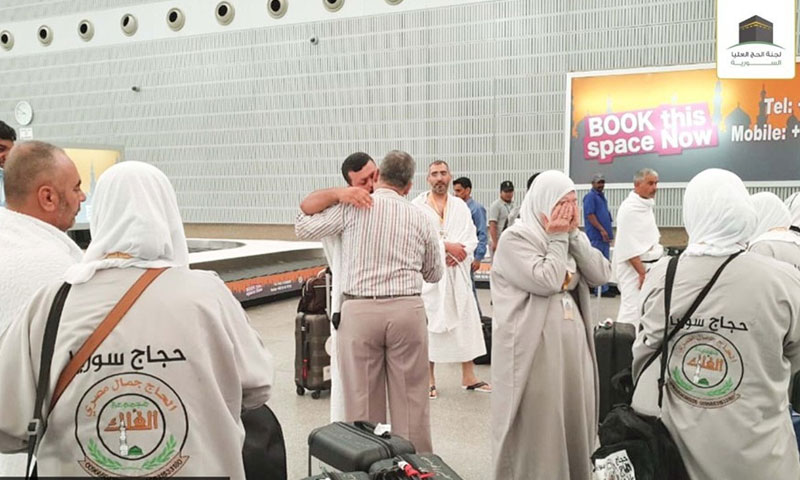



Men and women whom neither trade nor business diverts from the remembrance of Allah, nor the hardship of performing Hajj distracts from the remembrance of those who are left under fire. Sometimes they pray for their families and their children in Syria; at other times, they think of the tragedy of returning from the place where they felt most safe to the crossfire.
A small group of people from Idlib gathered in their hotel room in Mecca watching the outcomes of Astana Talks in pain and silence, upbeat about the unconfirmed news of a conditional ceasefire agreement in Idlib, the province they left for a few days on Hajj, hoping to return to it and meet their families in better conditions.
The five men, visited by Enab Baladi in their hotel in Mecca, are a sample of a group of people who have left their towns- which have been under constant shelling since last April, due to the air campaign, initiated by the Russian-backed Syrian regime against the southern countryside of Idlib- for performing Hajj while fear for their loved ones sticks in their throats, combined with joy for visiting al-Masjid an-Nabawī and the Masjid al-Haram.
“It is the journey of a lifetime, but I wish that my country was in a better condition,” a phrase that Haji Taher al-Assi repeatedly heard aboard the bus, taking them to the Kaaba. Taher repeated the phrase to his roommates at the hotel, feeling their sorrow and touching how it resonated in their minds as well.
Taher, the son of Jabal al-Zawiya, southern countryside of Idlib, mentioned that he has not stopped praying for his family in Idlib since the first day he arrived at Mecca, noting that the journey to Saudi Arabia was “smooth” despite some “routinely” obstacles.
However, Taher was interrupted by Haji Ahmed Azizeh, the son of Ariha in rural Idlib, speaking about the suffering they experienced as they left their towns for the Bab al-Hawa border crossing, where they had to spend a whole day. Then, by land, they headed to Turkey and then flew to Saudi Arabia.
“We left our children and our families under the bombardment. We hold our phones every hour to check on them. In fact, we have lost our nerves since we left our lands; but still, it is an opportunity to perform this religious duty,” Azizeh added, describing his feelings.
Ahmed did not deny that he hesitated before submitting his file to the Syrian High Hajj Committee, fearing for his family. Nevertheless, he followed his mind rather than his heart and resolved the issue of traveling driven out by his religious duty, as he explained to Enab Baladi.
Here, Haji Mustafa Zainuddin jumped into the discussion and directing his words to the congregating persons before him, he said that performing Hajj is like defending the land, trying to make the attendees feel less guilty, for guilt took over the place.
“We are satisfied with the destiny that Allah has designed us, and we know that we left our families and land behind. However, it is also important to pray for them from here.”
In addition to talking about their families in Idlib, the five participants approached the political, economic and social realities of their areas, which are outside the control of the Syrian regime. Then, they criticized the political and field raft within the opposition ranks and questioned the future of their children’s education in these areas and if their schools and university degrees are recognized.
Further into the discussion, the five pilgrims talked about the possibility of developing their business and improving their economic status, given the uncertain foggy future lying ahead of them.
Haji Ahmad Obeid, from Jabal Al-Zawiya, informed Enab Baladi about the additional obstacles he encountered when he decided to travel to perform Hajj. He says that most of the pilgrims in Idlib were subject to criticism before to their travel to Saudi Arabia. Some people demanded that they pay the Hajj money to the migrants and internally displaced persons instead of giving it to Saudi Arabia.
“But [Hajj] is a religious duty, and there are specialized organizations, concerned with assisting the displaced and the needy.”
According to statistics issued by the United Nations (UN), the number of displaced persons in Idlib since last April has reached more than 440 thousand people, who fled the extensively bombed areas to safe ones, amid a languishing humanitarian crisis. The latest military campaign in Idlib took a toll on 500 civilians, in whose death the inaction of the international community also played a role.
Despite the uncertainty and hesitations that eventually led them to Saudi Arabia, Idlib’s pilgrims were among 22,500 Syrians who came from all over the world to perform the Hajj this year, according to the figures of the Syrian High Hajj Committee, which is part of the national coalition for the Syrian opposition. There, Syrians share their worries unified by one land before they are scattered once more at the end of the holy pilgrimage.
if you think the article contain wrong information or you have additional details Send Correction